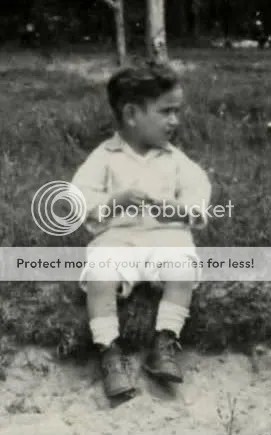One of my earliest memories is of dinner at Grandma Rose’s house. Her towels, furniture, and closets smelled of mothballs; she even stored her silverware in mothballs. Mostly, though, I recall standing on Grandma’s couch to study the framed collage of black and white photographs on her wall. I recognized my father, but knew the other boy in the pictures only by name, and by heart.

Uncle Lewis was my father’s only sibling, younger than my dad by ten years. We never met, and Daddy never spoke of him. But they were best friends. In one picture Lewis was laughing, having been surprised on the toilet by my father with his camera. The brothers teased Grandma too. Lewis would yell, “Harry, stop hitting me!” Grandma would rush in, and scold my father for picking on his little brother. Undaunted, they’d laugh and repeat, until Grandma caught on.

Soon after the attack on Pearl Harbor, Lewis was drafted into the infantry, a shy studious eighteen year old who had never kissed a girl. My father joined up as an officer. He pulled a few strings to get Lewis transferred into the 30th ‘Old Hickory’ Division, so the brothers could cross the Atlantic on the same ship. Lewis wrote letters and post cards home, often addressed to their dog ‘Peanuts.’

“Hey, Peanuts, tell Pa to eat his spinach!” From the ship he wrote, “Harry and his buddies sneaked me into their cabin. They gave me chocolate and let me play with their puppy. Don’t tell anyone, or we’ll all catch it. They smuggled the pup on board, and officers shouldn’t fraternize with enlisted men…”
While serving in Africa, Italy, England, France, and Germany, Harry was safely behind the front lines. But Lewis was sent to Normandy two days after the D-Day invasion. He fought in the hedgerows of France, and in Holland. “The Dutch ran into the streets and passed out everything from soup to nuts. As we marched out of there in the middle of the night, you could hear the clink of cognac, whiskey, and wine bottles in the guys’ jackets, amidst all the cursing and the roar of the Jerrys’ planes overhead.”
To his parents Lewis wrote, “Dear Ma and Pa, today I saw General Eisenhower drive by.” Or, “Kronk said the war can’t last. It just can’t. And he said it with such an angelic look on his face, I believe him!”

But to my father he wrote, “You should see the bruise from where a bullet passed through my shirt, Brub. It was a close call.” Or, “They took Julian away. It’s so lonely here, Brub. He’s the reason I wouldn’t take that promotion to sergeant. We dug in together, took care of each other when things got rough. I don’t know how bad he’s hurt; I just hope he makes it, and escapes this Hell. Pray for me, Brub. Pray for me.”
On September 20, 1944, the day before his company attacked the Siegfried Line, Staff Sergeant Lewis Baltuck was killed by the blast of a shell. Twenty years old, he had hardly begun to live. He was survived by his parents, his dog Peanuts, and his brother Harry. He never had the time or the opportunity to fall in love and marry. He left no children to mourn for him—only the Bronze Star and the bronzed baby booties Grandma kept on her bookshelf until the day she died, more than forty years after her son’s death.

Harry married, had seven children, and built his own little house in Detroit. But for the rest of his life he suffered acutely from the unspeakable burden of depression and Survivor’s Guilt. When Grandpa Max died, my father became the sole caretaker of his widowed mother. There was no one to share that burden with, to joke with or jolly her along. Worst of all, crazed with grief, Grandma Rose blamed Harry for Lewis’s death.
I envied those kids who grew up with cousins to play with, and uncles who cared about them. Uncle Lewis would’ve been that kind of uncle, and my father would have been a different man, without that black cloud to live under. When Daddy died in 1965, we lost our connection to my father’s extended family, and our ties to our paternal cultural heritage were nearly lost as well. But it does no good to dwell on the past or to speculate on what might have been.

Uncle Lewis was right about one thing. War is Hell. The price it exacts is impossible to tally, and can never be repaid. When a soldier is killed, one heart stops beating, but many more are broken. The wounds inflicted upon whole families are so deep that the scars can still be felt after generations.
I swear my uncle’s little bronze baby booties will never end up on the bargain shelf at the Salvation Army Thrift Store, like so many others I have seen there. How sad to think that such precious keepsakes might be tossed into the giveaway because no one remembers or cares about the one whose little feet filled them.

I attended the 60th reunion of the Old Hickory Division in Nashville in search of someone who knew my uncle. I met only one man who remembered him…“a quiet man who didn’t say much, but when he did speak, he was always worth listening to.”
I tell my children that story, and many other stories about their Great Uncle Lewis. I am confident he will be cherished and remembered, not just for his tragic death, but for his joyful life.
copyright 2012 Naomi Baltuck